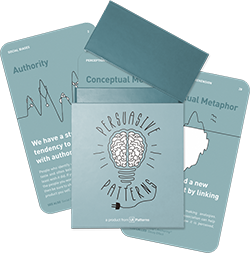Optimism Bias
Design Pattern
Alternate titles: Optimistic Bias, Positivity Bias, Unrealistic Optimism, Comparative Optimism.
Problem summary
We consistently overstate expected success and downplay expected failure
Usage
- Use to avoid being too optimistic about the future
- Use to help users downplay their optimistic thoughts about their own future accomplishments to instead focus on and set realistic goals.
This card is part of the Persuasive Patterns printed card deck
The Persuasive Patterns Card Deck is a collection of 60 design patterns driven by psychology, presented in a manner easily referenced and used as a brainstorming tool.
Get your deck!Solution
- Limit effect using other biases. Use other biases to guide decision making. For instance, use Loss Aversion to highlight potential negative effects of critical actions clear to the user and offer a straightforward and safer alternative.
- Use anchoring to force strategic thinking. To mitigate the Optimism Bias, it’s worthwhile to anchor in a pessimistic future first in order to keep the optimistic scenario more realistic. Simulate pre-mortems or “the future, backwards” exercises.
- Think strategically in both directions. Provide a more full perspective of future scenarios – positive ones and the negative ones as well.
Rationale
As we compare ourselves to our peers, we tend to overestimate our future success and downplay our future failure. We tend to believe in the best case scenario and ignore conflicting data as we look at what has worked in the past to predict the future, but often neglect to examine if something has been overlooked. Disclaimer: the Optimism Bias doesn’t seem to kick in for people suffering with depression.
Tali Shorat is among the leading researches on the Optimism Bias. Tali and her team has sown that optimists save more, are more healthy, take more vitamins and more readily adopt a low-fat diet. Although that sounds great, the bias can also lead to dangerous outcomes as it also means that we change our beliefs selectively in light of only positive information.
1 Sharot, T. (2011), The Optimism Bias, Current Biology, Volume 21, Issue 23, 6 December 2011, Pages R941-R945
2 Shepperd, J. A., et. al. (2002). Exploring the Causes of Comparative Optimism, Psychologica Belgica. 42: 65–98.
3 Optimism Bias at Learning Loop
User Interface Design Patterns
- Forms
- Explaining the process
- Community driven
- Tabs
- Jumping in hierarchy
- Menus
- Content
- Gestures
- Tables
- Formatting data
- Images
- Search
- Reputation
- Social interactions
- Shopping
- Increasing frequency
- Guidance
- Registration
Persuasive Design Patterns
- Loss Aversion
- Other cognitive biases
- Scarcity
- Gameplay design
- Fundamentals of rewards
- Gameplay rewards
